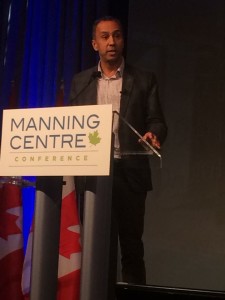
On February 27, I was asked to speak on a panel about electoral reform with former B.C. MLA, Nick Loenen and Conservative critic for Democratic Institutions, Scott Reid at the Manning Centre Conference in Ottawa.
Nick made the case that single transferable vote would be the best option for any reform while Scott argued that there were many unknowns about any reform and that the Conservative Party’s position was officially agnostic but that a referendum was essential in validating any electoral choice.
For my part, I argued first that the conversation about electoral reform has been wrong. It has placed the cart before the horse by talking about systems. Instead, any reform should begin with ideas about what values and principles should underpin the electoral system we want. The system is a product of those values. Second, I suggested that the process of reform (how we decide what we decide) should be deliberative and engage Canadians in a meaningful way. I don’t think traditional modes of consultation will be adequate but would love to see some kind of deliberative body, such as citizens’ assemblies, help the government frame the values and principles that should underlay any new system.
(how we decide what we decide) should be deliberative and engage Canadians in a meaningful way. I don’t think traditional modes of consultation will be adequate but would love to see some kind of deliberative body, such as citizens’ assemblies, help the government frame the values and principles that should underlay any new system.
On the issue of the a referendum, there are compelling arguments on both sides but my position is ‘referendum if necessary, but not necessarily a referendum’. The benefit of a referendum is that it confers legitimacy but the biggest problem with it is that referendums are notoriously blunt instruments. A citizens’ assembly — where real learning, deliberation and consultation takes place — is actually a higher threshold for legitimacy than a referendum which is not known as a place where civic education and deliberation occurs.
The issue of whether a referendum may ultimately be decided by the Court which will make a determination about whether S. 44, Constitution Act allows the federal government to act unilaterally to make changes to our voting system. In the Senate Reference case, the Court held that it was not sufficient to act unilaterally as “the purpose of [consultative elections] is clear: to bring about a Senate with a popular mandate” and that such a change “alters its fundamental nature and role.”
The question that the Court would answer in a reference case on electoral reform is whether a change in voting system alters the fundamental nature and role of representation. I would argue that any electoral system change must maintain the principle of representation by population (S. 42(1a) Constitution Act) and thus does not alter the fundamental nature and role of MPs.
2 Responses to “Electoral Reform at the Manning Centre Conference”
Hello Jonathan,
I met with you very briefly several months ago to discuss PR. I volunteer for FVC. You were going to meet with Minister Monsef to discuss PR. I suspect this article is the substance of that discussion and if so I applaud it.
A year of volunteering with FVC has been an education in the workings of a Democracy and its voting public that is all over the map on the issue of Electoral Reform. It has been an emotional roller coaster watching the shenanigans of all the vested interests and political parties.
I now better appreciate why so many voters prefer not to engage in dialogue regards electoral reform. Who can blame them for their disinterest.
This has been my first serious engagement in the political system and its inner workings . It has been an eye opener at 73 to affirm our system is truly broken yet it has also been rewarding to be involved with a diverse group of people who are committed to bringing about meaningful change so that future generations may live a better life under a system that better represents the wishes of the voter.
I soldier on because I believe the system must change but some days it is difficult to find the energy to stay engaged. I believe that real change is only going to happen when the younger generations take control of this process. It is also my hope we continue to work through the issues in a peaceful non-violent way. PR is only one aspect of a world system that is in jeopardy. The inequality is loathsome and PR is not about to change that on its own however, coupled with the many movements gaining traction across the globe it will contribute to the coming changes.
I admire your hard work and commitment to change. I have a somewhat vulgar principle I operate under that helps keep me engaged which is, ” Don’t let the Bastards wear you down” abbreviated to ” DLTBWYD “.
Regards,
Keith
[…] Parliamentary review.” (To that point: Queen’s University professor Jonathan Rose has suggested a process involving a citizens’ assembly could render a referendum […]